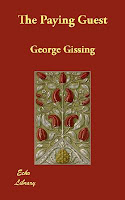After stumbling across references to George Gissing, a masterful late nineteenth century novelist, and then reading the superb book New Grub Street, I was intrigued to find one of his novellas, The Paying Guest, in our library’s online catalogue. It was initially published in 1895. My library’s copy is a reprint from 1968.
The book can be read in one sitting. It’s written in that wonderful, straightforward nineteenth century style. The principal characters are the Mumfords and Miss Louise Derrick.
The Mumfords are a respectable middle-class London couple who have taken a house in the suburbs for the health of Mrs. Mumford and their two-year-old son. They have a quiet, affectionate marriage. They are not financially constrained, but Mr. Mumford isn’t making much extra. So when he notices an ad in his newspaper, a young woman looking to take a room outside of London, he points it out to his wife. They have plenty of space, and a little extra money would be nice. So they reply to the ad.
After some awkwardness, the paying guest settles in. She is Louise Derrick, a working-class girl with ambition to raise herself but little formal education, a too-forward interest in men, a quick temper, and a wealthy stepfather who is so desperate to get her out of the house that he’s willing to pay anything to lodge her elsewhere. (It seems a Mr. Bowling, who was courting Louise’s stepsister, has shifted his attention to Louise.) There is a vulgarness about the situation and Louise’s family that puts the Mumfords off, but they don’t find Louise so bad. And they do want the money.
Well, Louise is that bad. She can behave well for a few days at a stretch, but she’s restless, untruthful, attention-seeking, and manipulative. She is being courted not just by her stepsister’s ex-fiancé, but also by a rough working class man with a temper to match her own. She doesn’t think he is quite good enough for her. She (and her mother) both hope the Mumfords will introduce her to better.
The classes clash. Louise is the nightmare guest who refuses to leave. The Mumfords, trapped by their own politeness and disgust for “scenes,” are unable to throw her out, even after her stepfather cuts off payment for her lodging.
Anxiety levels are high all around. Mrs. Mumford even begins to question her husband’s interactions with Louise. Her suspicion appalls them both.
It takes a cataclysmic event (which, when the dust settles, wasn’t really that cataclysmic) to dislodge the girl from their lives.
It isn’t a deep book. And there are plenty of contemporary examples of this type of plot that are likely more amusing and more hair-raising. Yet the social class difference gives this novel some poignancy and punch. And it’s fascinating to see that the trope of the obnoxious, disruptive guest who just won’t go was as disturbing and darkly comic in the nineteenth century as it is today.














Fun to read about a 19th century story on the clashing classes.
ReplyDelete